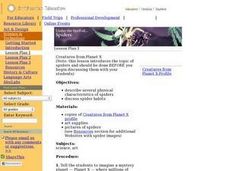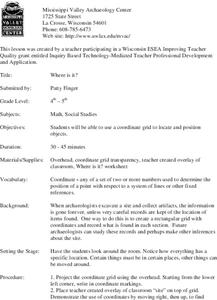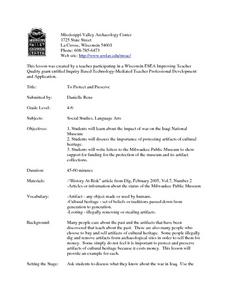Curated OER
Ancient Book Found in Ireland
Young scholars discuss items archeologists search for during digs and read a news article about a 2200-year-old religious book found in Ireland. They examine the article for examples of the passive voice. They make lists of items for a...
Curated OER
Ceramics: A Vessel into History
High schoolers create a personal clay vessel that has a specific use or meaning in their contemporary culture, which could be discerned through study by future archeologists and art historians.
Curated OER
It's in the Garbage
Pupils analyze how studying garbage relates to methods of archaeology. They examine garbage to determine things about their culture and relate that to prehistoric peoples.
Curated OER
Mystery of the Real Robinson Crusoe Solved
Students explore the location of the campsite of fictional character Robinson Crusoe. In this ESL lesson, students read an article that discusses the whereabouts of Robinson Crusoe's campsite, then have a class discussion on the...
Curated OER
Creatures from Planet X: Spiders
Young scholars are given a description of some fascinating animals from "Planet X". They follow the descriptions given to illustrate one of these animals paying careful attention to introduced vocabulary such as 'appendages',...
Southern Nevada Regional Professional Development Program
Pardon Me, Your Modifier is Dangling
Lost! (or misplaced) a modifier. Last seen dangling at the end of a sentence! Reward offered! To underscore the humor, class members are each given a sample sentence to illustrate (A woman passed by, leading a Springer Spaniel, in a long...
Curated OER
Clay Wipe Away: Ceramics
Discuss Pre-Colombian South American art with your class, then get out the clay and create some. Pupils practice using the wipe-away technique to create a ceramic tile similar to those made by the Maya. Great web links and a...
Curated OER
Relative Age Dating
Modeling dough and paper cutouts in science class? Learn about how relative age dating concepts, like the Law of Superposition and cross-cutting relationships, can be used to describe the formation of sedimentary layers.
Advocates for Human Rights
Who are Immigrants?
What do Jerry Yang, Patrick Ewing, John Muir, Charlize Theron, Peter Jennings, and Saint Frances X Cabrini all have in common? They are all immigrants to the United States. Famous and not-so-famous immigrants are the focus of a resource...
Smarter Balanced
Archaeological Discoveries
Artifacts, inscriptions, and monuments. Here's an activity designed to ensure that all learners are familiar with the key terms and concepts they will need to begin a study of archaeological discoveries.
Curated OER
Shadows of North Carolina's Past
Students construct a timeline of four major culture periods in Native American history from studying archaeological evidence cards.
Curated OER
Where is it?
Students use a coordinate grid. They investigate and discuss what caused certain objects to be in specific places. They choose a room in their home to map and place objects in specific locations.
Curated OER
Artifact Classification
In this artifact classification instructional activity, students are given a list of key terms and two activity sheets about classifying artifacts of the Pee Dee culture. Students analyze artifacts and group them to answer questions on...
Curated OER
Pieces of the Past
Students study the importance of preserving the archaeological record. They write a paragraph describing an object and why it is important to them. They cut their paper into a puzzle and compare their own to the student they trade with.
Curated OER
Preserve is the Word
Young scholars investigate a list of archaeological ethical questions. They select a question/issue and design a 3-minute (maximum) PSA to persuade the public to agree with their idea. They conduct research or interviews with experts to...
Curated OER
Effigy Mound Activity
Young scholars research effigy mounds of Native people in Wisconsin. They create large models of effigy mounds in a given area based on factual information from their studies and research.
Curated OER
What Culture Game?
Students examine artifacts from ancient cultures. They compare the differences and some similarities that may exist . They decide on at least two artifacts per area for each of the three cultures chosen and explore diversity.
Curated OER
A Glimpse into the Past of Ancient Egyptian Culture
Students explore ancient Egyptian culture, and relate the lives of ancient Egyptians to their own.
Curated OER
Inference By Analogy
Students infer the use or meaning of items recovered from a North Carolina Native American site based on 17th-century European settlers' accounts and illustration.
Curated OER
Crossroads of the Continent: Early Trade in Kansas
Students study early Native American-European trade. They play bartering games to discover trade as an economic funtion, as well as other implications of trading one good for another.
Curated OER
How To Find a Site
Fourth graders identify the three basic needs of humans. They identify on a map the best places to live and make a list of items that they can find on a map - streams, river, hills, plains, forests, etc.
Curated OER
To Protect and Preserve
Students discuss the impact of war on the Iraqi National Museum and the importance of protecting artifacts of cultural heritage. They write letters to the Milwaukee Public Museum to show support for funding for the protection of the...
Curated OER
How Old Is Mike?
Students examine the absolute dating of fossils, they use a list of names and ages to determine the difference between relative age and absolute age. They explore the relative age and absolute age of people and of fossils.
Curated OER
Archaeological Inquiry
Students describe what they see as they observe an "artifact". They draw conclusions based on the information gathered to identify what the artifact might be used for and determine how old it might be.

























